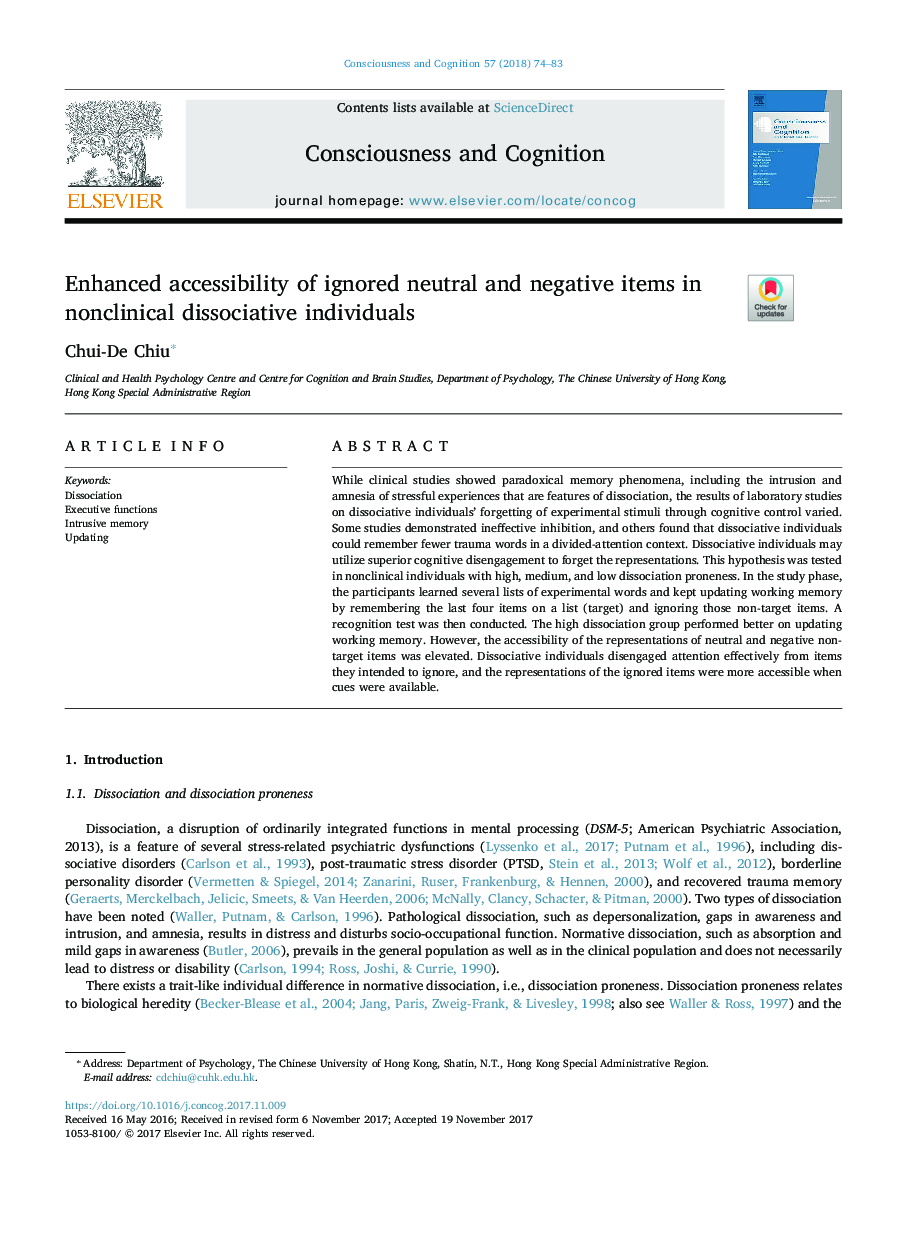| کد مقاله | کد نشریه | سال انتشار | مقاله انگلیسی | نسخه تمام متن |
|---|---|---|---|---|
| 7288205 | 1474154 | 2018 | 10 صفحه PDF | دانلود رایگان |
عنوان انگلیسی مقاله ISI
Enhanced accessibility of ignored neutral and negative items in nonclinical dissociative individuals
ترجمه فارسی عنوان
دسترسی پیشرفته به عبارات خنثی و منفی نادیده گرفته شده در افراد غیر انسانی غیر کلاسیک
دانلود مقاله + سفارش ترجمه
دانلود مقاله ISI انگلیسی
رایگان برای ایرانیان
کلمات کلیدی
انحلال، عملکرد اجرایی، حافظه مزاحم، در حال بروز رسانی،
ترجمه چکیده
در حالی که مطالعات بالینی پدیده های حافظه پارادوکسی را نشان می داد، از جمله نفوذ و آمنیازیای تجربیات استرس زا که ویژگی های تجزیه هستند، نتایج مطالعات آزمایشگاهی در مورد فراموشی افراد محرک تجربی از طریق کنترل شناختی متفاوت بود. برخی مطالعات نشان داد که مهار ناخوشایند، و برخی دیگر دریافتند که افراد متضاد می توانند کلمات ضعف تر را در یک متن متمایز توجه کنند. افراد متخلف ممکن است از اختلال شناختی برتر استفاده کنند تا تجارب را فراموش کنند. این فرضیه در افراد غیروابسته با بالا بودن، متوسط و ضعیف است. در مرحله مطالعه، شرکت کنندگان چندین لیست از کلمات آزمایشی را یاد گرفتند و با به خاطر سپردن چهار عنصر در لیست (هدف) و نادیده گرفتن موارد غیر هدف، آنها را به روز نگه داشت. سپس یک آزمایش شناختی انجام شد. گروه جداسازی بالا در ارتقاء حافظه کاری بهتر عمل کرد. با این حال، دسترسی به بازنمودهای آیتم های بی طرف و منفی غیر هدف بیشتر شد. افراد مشتاقانه به طور موثر از مواردی که قصد نادیده گرفتن آن را داشتند توجه جدی نداشتند و بازنمودهای موارد نادیده گرفته شده در هنگام دسترسی به نشانه ها بیشتر قابل دسترسی بودند.
موضوعات مرتبط
علوم زیستی و بیوفناوری
علم عصب شناسی
علوم اعصاب شناختی
چکیده انگلیسی
While clinical studies showed paradoxical memory phenomena, including the intrusion and amnesia of stressful experiences that are features of dissociation, the results of laboratory studies on dissociative individuals' forgetting of experimental stimuli through cognitive control varied. Some studies demonstrated ineffective inhibition, and others found that dissociative individuals could remember fewer trauma words in a divided-attention context. Dissociative individuals may utilize superior cognitive disengagement to forget the representations. This hypothesis was tested in nonclinical individuals with high, medium, and low dissociation proneness. In the study phase, the participants learned several lists of experimental words and kept updating working memory by remembering the last four items on a list (target) and ignoring those non-target items. A recognition test was then conducted. The high dissociation group performed better on updating working memory. However, the accessibility of the representations of neutral and negative non-target items was elevated. Dissociative individuals disengaged attention effectively from items they intended to ignore, and the representations of the ignored items were more accessible when cues were available.
ناشر
Database: Elsevier - ScienceDirect (ساینس دایرکت)
Journal: Consciousness and Cognition - Volume 57, January 2018, Pages 74-83
Journal: Consciousness and Cognition - Volume 57, January 2018, Pages 74-83
نویسندگان
Chui-De Chiu,
